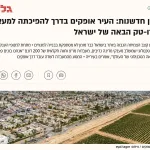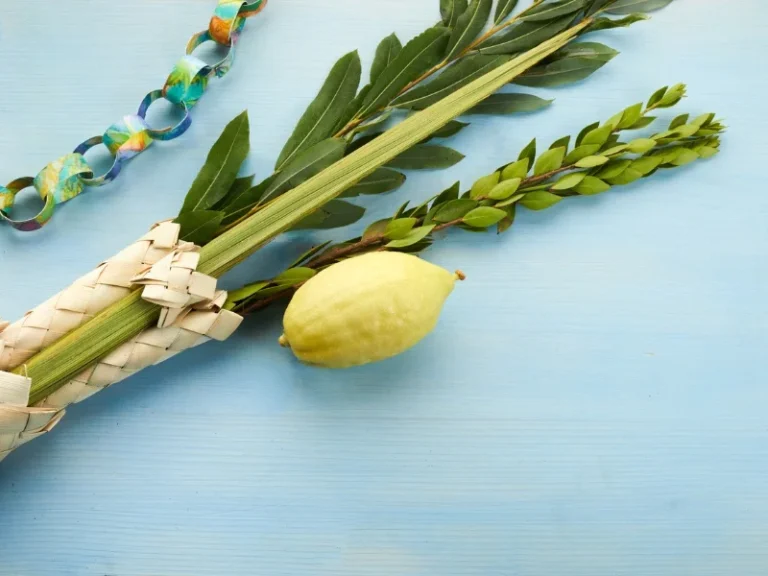Returning to Israel with the Four Species? Make sure you don’t have a troll in your trolley!
The preparations for the Tishrei [September/ October] festivals are already in full swing, and Ben Gurion Airport has already become a congested hub with passengers and luggage. As is the case every year, prior to the month of Tishrei [September – October] festivals and during the course thereof, the Plant Protection and Inspection Services at the Ministry of Agriculture increase their presence at border control points, in view of the increase in the number of attempts by private individuals and traders to bring the “four species” into Israel, which may be infected with various pests. This year, following an increase in the number of smuggling incidents, the Ministry is also leading a dedicated information campaign under the title “Make sure you don’t have a troll in a trolley”.
According to the Plant Protection Law, and in order to prevent the transfer of pests between countries, it is forbidden to bring fruit and vegetables into the territory of the State of Israel through a border crossing. However, there is an exception according to which each passenger may bring one Etrog [citroen] only into Israel. The rest of the set of the species may not be brought into Israel due to the apprehension that they are infected with pests that could affect local agriculture and will therefore will be confiscated at the borders of the country. Despite this, in order to accommodate the travelers returning to Israel who brought the four species with them from foreign countries,the inspectors of the Ministry of Agriculture will give the travelers, free of charge, a personal “Made in Israel” set (in lieu of the confiscated set), which includes myrtle, willow and lavender, while the aforementioned etrog can be brought into Israel legally.
In recent months, the Ministry of Agriculture has been dealing with an increasing trend of incidents of smuggling of plant produce into Israel. Therefore, according to the data of the Plant Protection Services and the inspectors of the Ministry, since the beginning of 2023, more than 1,000 passengers have been caught in the airport with various types of plant material in their luggage, that is prohibited from entering the country. The total quantity of plant produce that was seized and sent for destruction is about 4 tons (!) and represents an increase of about 100% compared to the corresponding period last year (2022), which included, inter alia: Fruit, vegetables, flower seeds and tree parts. In an effort to raise awareness among the public about this important issue, the Ministry is leading a platform wide campaign on the issue of not bringing plant-based products into Israel under the title “Make sure you don’t have a troll in your trolley”. The campaign, which highlights the risks involved in introducing plant products in an unsupervised manner and without approval from the relevant authorities, was distributed both in the traditional media, in social networks and through signs placed throughout Ben Gurion Airport.
It is important to remember that any attempted transfer of agricultural produce to the borders of the State of Israel, without the approval of the plant protection services and the inspection of the Ministry of Agriculture, is a violation of the law. The Ministry of Agriculture established this policy due to the fact that when agricultural produce is brought into the territory of the State of Israel in a manner that is not inspected by the Plant Protection and Inspection Services, this may lead to the introduction of pests that do not exist in Israel. Such pests may damage local crops and thus cause irreversible damage to agriculture and even lead to the extinction of entire branches of agriculture. Moreover, the State of Israel exports agricultural produce to many countries, such as: Europe, the Far East, Russia and the USA. Therefore, apart from the immediate danger to agriculture in Israel, this may affect the export industry and the economy of the country.
The process that occurs when an importer or citizen requests to bring in agricultural produce from a foreign country includes conducting tests by the Plant Protection and Inspection Services to verify that the produce meets the import requirements. It is important to remember, the pests may be concealed inside the produce and are not always visible. Even a tiny insect hidden in a lily, myrtle or willow plant may cause the establishment of a new species of insect or pest and, in the end, severely damage the local agricultural industries.
Shlomit Zioni, the Director of Plant Protection and Inspection Services at the Ministry of Agriculture, stated: “We call on the citizens of Israel to help protect Israeli agriculture and prevent a situation that could endanger local produce. Upon the introduction of fruit, vegetables, seeds, flower seedlings as well as the four species that have not been approved by the Plant Protection and Control Services, there are serious risks, such as diseases and pests, that may be introduced into the country together with the produce. In most cases, the pests will be concealed from view, but may cause irreversible damage to agricultural crops, plants and ornamental foliage. Together we will keep a happy and safe Sukkot holiday for Israeli agriculture.”
For additional questions, contact the hotline center of the Ministry of Agriculture and Food Security, available Sunday-Thursday 7:30AM-7:30PM by phone on: *6016.































